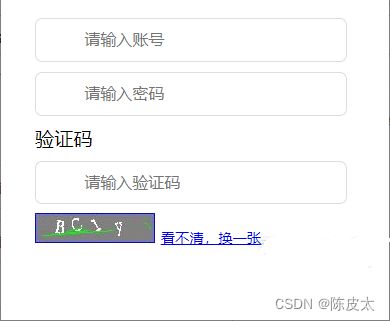后台生成随机验证码验证登录
web get请求获取图片
后台代码:
/*获取动态验证码*/
@ResponseBody
@RequestMapping(value = "/get/code", method = {RequestMethod.POST, RequestMethod.GET})
public void getCode(HttpServletResponse response) {
creatImg(response);
}private void creatImg(HttpServletResponse response) {
int width = 120;
int height = 30;
// 在内存中生成图片
BufferedImage image = new BufferedImage(width, height, BufferedImage.TYPE_INT_RGB);
// 先获取画笔对象
Graphics2D g = (Graphics2D) image.getGraphics();
// 设置灰色
g.setColor(Color.GRAY);
// 画填充的矩形
g.fillRect(0, 0, width, height);
// 设置颜色
g.setColor(Color.BLUE);
// 画边框
g.drawRect(0, 0, width - 1, height - 1);
// 准备数据,随机获取4个字符
String words = "ABCDEFGHIJKLMNOPQRSTUVWXYZabcdefghijklmnopqrstuvwxyz1234567890";
// 设置颜色
g.setColor(Color.white);
// 设置字体
g.setFont(new Font("隶书", Font.BOLD, 20));
String code = "";
//构造存储字符的数组
char[] a = {};
//构造存储字符串的集合
List list = new ArrayList();
Random random = new Random();
int x = 20;
int y = 20;
for (int i = 0; i < 4; i++) {
// void rotate(double theta, double x, double y)
// theta 弧度
// hudu = jiaodu * Math.PI / 180;
// 获取正负30之间的角度
int jiaodu = random.nextInt(60) - 30;
double hudu = jiaodu * Math.PI / 180;
g.rotate(hudu, x, y);
// 获取下标
int index = random.nextInt(words.length());
// 返回指定下标位置的字符,随机获取下标
char ch = words.charAt(index);
//将字符存入字符数组中
char[] chc = {ch};
//使用字符数组构造字符串
String string = new String(chc);
//将构造好的字符串添加进list集合中
list.add(string);
// 写字符串
g.drawString("" + ch, x, y);
g.rotate(-hudu, x, y);
x += 20;
}
for (int i = 0; i < list.size(); i++) {
code += list.get(i);
}
//将验证码存入上下文中
servletContext.setAttribute("code", code);
// 设置颜色
g.setColor(Color.GREEN);
int x1, x2, y1, y2;
// 画干扰线
for (int i = 0; i < 4; i++) {
x1 = random.nextInt(width);
y1 = random.nextInt(height);
x2 = random.nextInt(width);
y2 = random.nextInt(height);
g.drawLine(x1, y1, x2, y2);
}
// 输出到客户端
try {
ImageIO.write(image, "jpg", response.getOutputStream());
} catch (IOException e) {
e.printStackTrace();
}
} 登录验证:
@RequestMapping(value = "/user/login", method = {RequestMethod.POST, RequestMethod.GET})
public void Login(@RequestBody UserBean userBean, HttpSession session, HttpServletResponse response) throws Exception {
String code = userBean.getCode();
//从上下文获取存储的验证码
String code1 = (String) servletContext.getAttribute("code");
//账号密码为admin.且验证码(忽略大小写)输入正确,则跳转到登陆成功页面
if ("".equals(code) || code == null || !code.equalsIgnoreCase(code1)) {
HttpServletResponseUtil.back(response, 202, "验证码错误!", null);
return;
}
QueryWrapper queryWrapper = new QueryWrapper<>();
queryWrapper.eq("username", userBean.getUsername());
queryWrapper.eq("password", userBean.getPassword());
List beans = mapper.selectList(queryWrapper);
if (beans != null && beans.size() > 0) {
log.info("登陆成功,用户名:" + userBean.getUsername());
log.info("登陆成功,密码:" + userBean.getPassword());
session.setAttribute("loginUser", userBean);
HttpServletResponseUtil.back(response, 200, "登录成功!", null);
} else {
HttpServletResponseUtil.back(response, -1, "账号密码错误", null);
}
}
